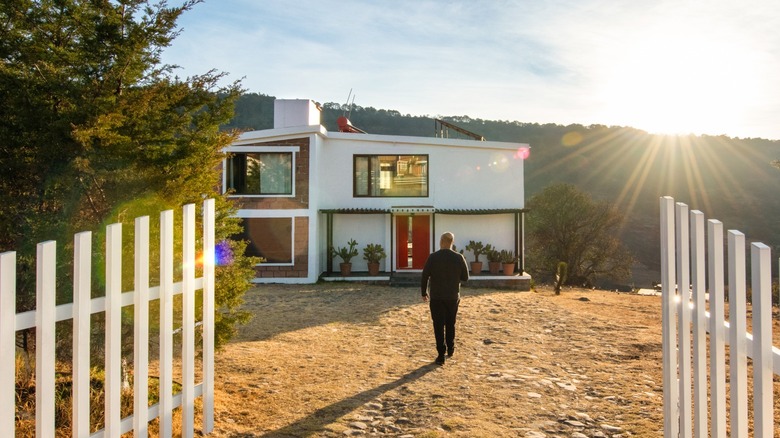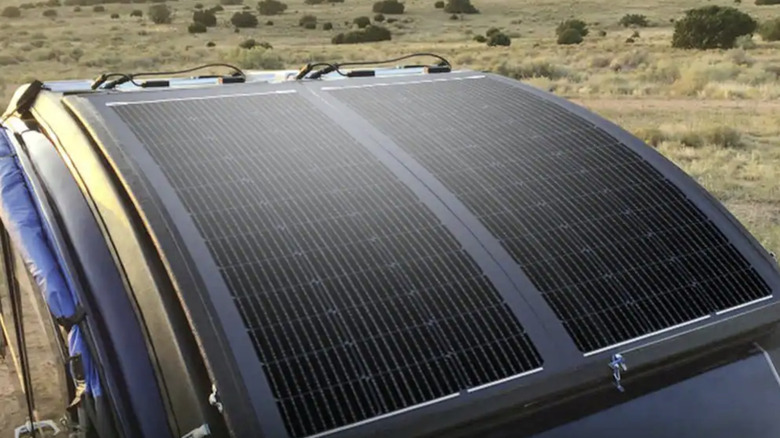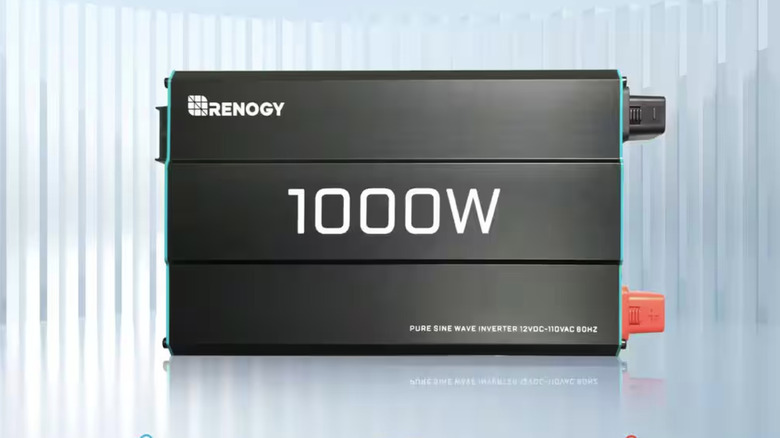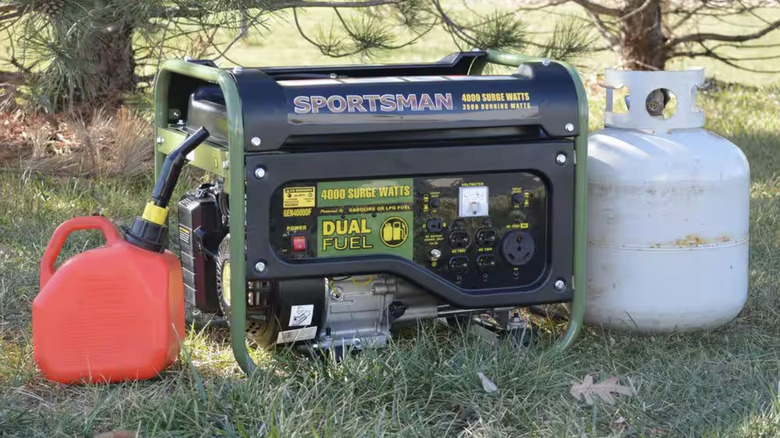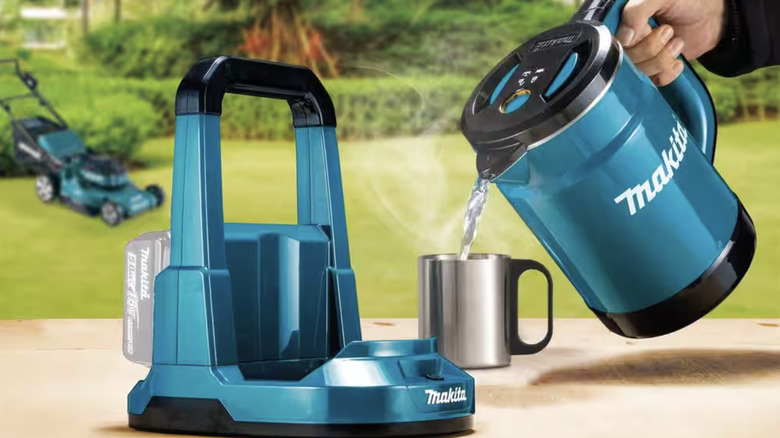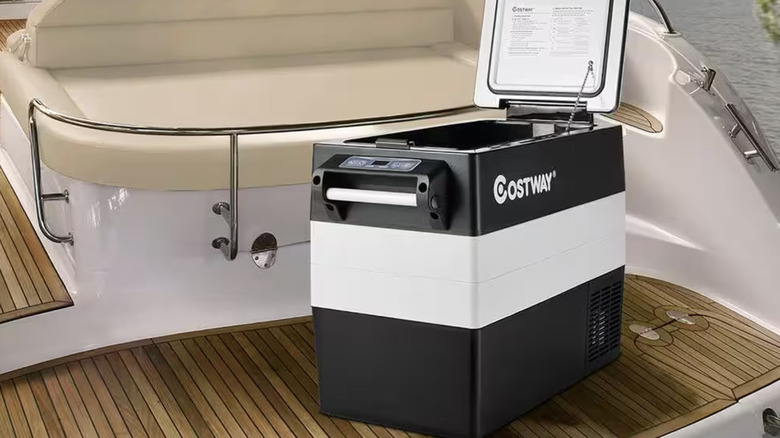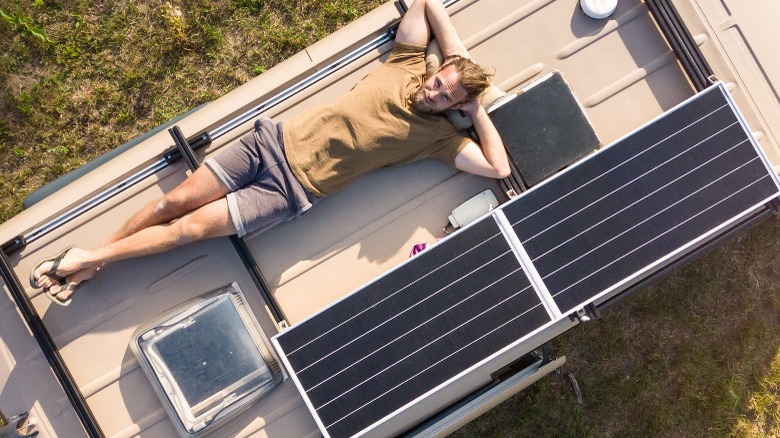5 Home Depot Finds You'll Want To Have If You're Going To Live Off-Grid
We may receive a commission on purchases made from links.
Living off-grid is a freeing yet relatively complicated experience if you're new to the idea — it's more than just laying in the woods somewhere away from the noise of society. There are many gadgets and off-grid tools you may want to have handy to help make the lifestyle more manageable and, frankly, more enjoyable.
Home Depot offers many products to help get you started on your off-grid journey, whether you're planning to live as a digital nomad out of an RV or set up a small space on some newly acquired land. At the home improvement retailer, you can find off-grid solar panel kits to place on your roof, and electric kettles built for the outdoors. Based on high ratings and a variety of reviews from consumers who have actively used the products — as well as our own experience being off-grid — here are five Home Depot finds you'll want to have if you're going to live off-grid. A more in-depth explanation of our methodology can be found at the end of this article.
Renogy 100 Watt Flexible Monocrystalline Solar Panel
If you're living off-grid, the first thing you need to consider is how you will power your equipment, charge your laptop and turn on lights. There are multiple electricity sources you can choose from, but one of the cleanest and most popular off-grid power sources is solar panels. Renogy, a reliable renewable energy source company, offers all the parts you need to build out your off-grid solar set-up. At Home Depot, you can find the 100 Watt Flexible Monocrystalline Solar Panel, which can provide an average of 500 watt-hours per day, depending on how much sun is available.
This panel is lightweight and durable, making it easy to either install on the top of your RV or place on the ground. If you're planning to install it on a roof, it's able to bend up to 240 degrees, and from experience, we can state that the flexibility does not affect the energy-harnessing capabilities. It can also withstand extreme weather conditions, from high winds to heavy snowfall. It has a 4.5 out of five-star rating from nine reviewers on Home Depot's website and 815 ratings on Amazon. It is also a personal recommendation from this writer. Of course, depending on how many items you have using power will determine how many solar panels you will need. Often, one 100 watt panel won't cut it, but it is a good place to start.
Renogy 1000 Watt Pure Sine Wave Inverter
Unless you're working off a self-contained power source that only requires solar panels and a power station like the Jackery Explorer 1500, you're more than likely going to need an inverter to transfer the battery's power to consumer electronics. When the solar panels collect power for your batteries, it comes in as 12V, 24V, or 48V output depending on what you purchased. Once your solar controller converts the power to 12V for your battery, you can use Renogy's 1000 Watt Pure Sine Wave Inverter to convert it to 120V AC. It'll run cleaner and more reliable than a modified sine inverter for your more delicate electronics like a laptop, and it won't cause any humming or static. However, if your battery has a 24V DC output, you'll need a 24V inverter instead. You can find a 24V inverter on Amazon from Victron, another popular and reliable energy alternative company.
This pure sine inventor comes with a 4.8 out of five-star rating from 48 reviewers and is a personal recommendation. It's important to be aware that you can only use electronic devices that are under 1000 starting and running wattage, or eight amps. To figure out the amps or watts of any given device, use Watt's Law, which is amps x volts = watts. For example, if the box of a hairdryer says seven amps and 120 volts, you'll know that it runs at 840 watts, which is well under this inverter's allowance. However, you won't be able to run much else off of it. In that case, you can always go to a higher watt pure sine inverter. Just be aware that if you use a 2000 watt inverter with a 1000 watt-hour battery, you'll only get 30 minutes of power at full load with no power being placed back in. If that worries you, you can always opt for more battery capacity.
Sportsman 4000/3500 Watt Dual Fuel Gasoline Propane Portable Generator
You could have a whole solar power system that would keep your batteries at 100% on a sunny day, but what happens if it's a rainy week and there's no sun to keep you powered? You don't have to use a generator all the time to keep you going, but it is good to have one on hand as a backup. Home Depot sells the Sportsman 4000/3500 Watt Dual Fuel Gasoline Propane Portable Generator, which comes with a 4.4 out of five-star rating from over 1,500 reviewers. The cool aspect of this specific generator is the ability to use either gasoline or propane to generate electricity for your batteries. If you're already carrying propane for your stove or a heater, you don't have to also carry gasoline — you can simply use the same fuel for all your devices. However, the option for gasoline is always available to you.
This generator has a 4000 watt peak output and 3500 watt running output, which is usually enough to power most household appliances and power tools. It can run up to 10 hours at a 50% load using gasoline and 12 hours at a 50% load using propane. A downside of this generator, though, is its performance at altitude. The company recommends you don't use it above 3,000 feet above sea level, so if you're planning on living off-grid in the Rocky Mountains, this may not be the generator for you. However, Home Depot sells several other generators that may meet your needs.
Makita 36V LXT Hot Water Kettle
When living off-grid, preserving electricity becomes a priority, especially if you have to be conservative with your watt-usage. Hot water is not something most people want to give up, and though you can use a camping stove to boil water, sometimes it's easier to let a nifty gadget do it for you. Makita's Outdoor Adventure line of tools and products can make camping and living off-grid more comfortable. Within that line is the 36V LXT Hot Water Kettle, which comes with a 4.4 out of five-star rating from 27 users on Amazon – Home Depot has a five-star review from only one person.
This kettle can boil up to 27 ounces of water in nine minutes and has an auto shut-off feature, so you're not wasting your battery power. It does take two 18V batteries to use the kettle, but with Makita's charging kit, it only takes one 18V 4.0Ah battery 40 minutes to charge one. We'd recommend waiting until a sunny day to charge all your batteries or plug in at a local coffee shop while drinking a latte.
Something to keep in mind with this product is if you do not own any Makita batteries already, it will be a bit pricey upfront. The kettle is $229, the charging kit mentioned above that comes with the battery charger and one 18V 4.0 Ah battery is $194, and an extra 18V 4.0 Ah battery (because the kettle requires two) is $139. However, by investing in Makita's battery line, you open yourself up to purchasing other tools to make off-grid living easier.
Costway 55 Quart Portable Refrigerator
You may think you would have to give up on refrigeration if you go off-grid — most domestic fridges use more power than your battery supply could easily keep up with. However, companies are starting to produce fridges that don't need nearly as power to run. We consider the Costway 55 Quart Portable Refrigerator to be one of the most popular fridges for your campervan or other off-grid rig. At Home Depot, it comes with a five-star review from only five people, but on Amazon, it has a 4.2 out of five-star rating from over 75 reviewers.
You have the option of using either a 12V DC or a 120V AC source to power this fridge, and it only uses between 40 and 72 watts of power — equivalent to a single old-style incandescent bulb — so is feasible to power from most sources. It comes with two food storage areas: One is strictly a fridge section and the other can be either a fridge or a freezer. Keep in mind that the colder you need, the more power it will consume. At 55 quarts, it can hold an impressive amount of items like 84 cans of soda or 19 bottles of wine. It also has a fast freeze option, so your ice cream won't melt on a hot day.
Our methodology for selecting these living off-grid finds
Each of these Home Depot products was selected based on personal use with positive results, and high ratings and reviews from others who have used them. They come with at least a 4.2 out of five-star rating and cost under $440. This makes these items both reliable and relatively affordable in terms of off-grid living.
These items would work well living off-grid in an RV or even a tiny home, depending on your planned electricity provision. However, if you're going to use a lot of power, some of these items like the 100 watt solar panel and the 1000 watt inverter won't be enough for your energy demands. We do recommend you do more research, not only to make sure you purchase the products that will work best for your needs, but also to learn how they work. There's a lot of information that comes with understanding solar panels and living unconnected, but the more you know, the more comfortable the off-grid lifestyle will be for you.
